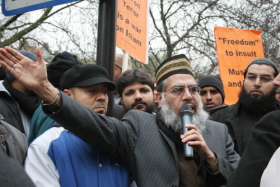
Copenhagen/Cairo, Feb 7 (DPA) — Some observers in Denmark see “agitation” by Danish imams travelling in the Middle East as the spark that caused the conflagration of religious passions.
In the Arab world, there are those who suspect that the increasingly violent demonstrations are the product of cynical political calculation by Arab regimes using anger for their own purposes.
The conflict is playing into the hands of Islamist groups. In some Islamic countries, a contest of sorts has broken out between the government and opposition to see which side is doing more “to defend the Prophet”.
When the cartoons were first published on Sep 30 in the Jyllands-Posten, Denmark’s biggest paper and sharply critical of Islam, it initially looked like just another skirmish in Denmark’s heated debate over immigration and the proper attitude towards Islam.
It took nearly three weeks before the ambassadors of 11 Islamic countries demanded that the Danish government intervene and asked to speak with Prime Minister Anders Fogh Rasmussen.
Rasmussen, citing press freedom, coolly refused, which critics now say was a big mistake in crisis management. Among those critics are 22 former Danish ambassadors who spoke out in December. They also faulted what they said was Denmark’s overly harsh tone towards Islamic immigrants.
Meanwhile, imams resident in Denmark were travelling around Arab countries with the cartoons, showing them as well as other unflattering caricatures of the Prophet circulating in Denmark that the newspaper had not published.
Many Danes believe this is what set off the huge wave of protests. Danish government sources said the imams responsible may be deported.
The imams themselves say indignation spread in January during the Haj in Makkah. The “tsunami of protest” then swept over Denmark at the end of January, when Saudi Arabia recalled its ambassador to Copenhagen and devout Saudis called for a boycott of Danish products.
Many Muslims have followed the call. In Cairo, the largest city in the Arab world, signs have gone up in supermarkets saying, “We don’t sell any Danish products.”
In the English-language Saudi newspaper Arab News, there was even a call on Monday for a total, long-term boycott of Western goods aimed at forcing Western countries to “apologise for having insulted our beloved Prophet.”
But after thousands of young Muslims attacked and set fire to Danish and Norwegian diplomatic missions in Beirut and Damascus over the weekend, some voices in the Middle East are now urging moderation.
An editorial by the pan-Arab daily newspaper Al-Sharq Al-Awsat Monday said the initially spontaneous protests against the caricatures were now being instrumentalised by extremists.
It “makes no sense to smash things blindly, without a specific goal,” the editorial said, adding, “We shouldn’t regard Western countries as the enemy”.
The English-language Lebanese newspaper The Star went even further, a day after businesses and automobiles in a Christian quarter of Beirut were destroyed along with the Danish Consulate.
“The damage that the rioters did – both to Lebanese property and to the image of Islam – was far worse than that done by the cartoons which desecrated the Prophet Mohammed,” the paper said.
© 2006 IANS India Private Limited, New Delhi. Posted on Religioscope with permission. — Indo-Asian News Service (IANS) is India’s first multinational and multilingual wire service. Website: www.ians.in. Subscription enquiries: contact IANS (mention Religioscope).